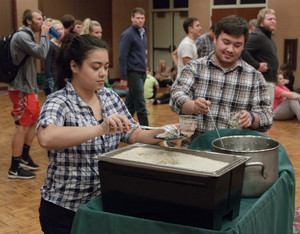Oxfam Banquet opens eyes

CHADRON – The goal of the students in Dr. Shaunda French’s Event Planning and Leadership (CA 239) hosting the Oxfam Hunger Banquet in the Student Center Ballroom Monday, was to provide awareness of a global issue in a simple, yet visceral way.
“What the students of CA 239 hoped to accomplish tonight was to illustrate to the participants that food insecurity could happen to anyone, and that we can all make a difference in so many ways within our community,” French said.
The second annual banquet separates attendees into three separate groups by providing attendees with random profile cards. Profiles illustrate three socio-economic standings: Low-income, middle-income and high-income. The proportion of cards are relative to the world’s population at each level of socio-economic standing.
Participants are then served meals, based on which level of income on their profile cards. Low-income and middle-income served themselves water and rice, and water and beans, respectively. High-income were served a full course meal by CSC’s dining service.
Wacey Gallegos of Ainsworth, Colo., an intern for French who helped coordinate the event, addressed the crowd upfront about the intentions of the banquet.
“There may be discomfort throughout this banquet, but the intention is to shed light on hunger, malnutrition and problems with food in our world. We are not trying to offend or disrespect anyone, or any class,” Gallegos said.
Pastor Ann Sundberg of Immanuel Lutheran Church provided a keynote speech that revolved around food insecurity, hunger issues and being proactive. She elaborated on the concept of food deserts, which are areas where nutritious food is difficult to obtain for a variety of reasons.
According to Sundberg, food deserts even exist regionally.
“Dawes County is not a food desert, but the places around us are and sometimes we fail to realize that. We have to understand this and take action because no one should go hungry, yet people do,” Sundberg said.
Throughout the banquet, the CA 239 students led discussions in groups amongst the different income classes, and also provided information and statistics regarding hunger issues.
Tyler Pittman of Box Elder, South Dakota, closed the night by encouraging the participants.
“If what you have experienced tonight is eye-opening, then, we encourage you to go out and do something about it. One voice might not do much, but multiple voices that come together can initiate a change and that starts with you,” Pittman said.
Category: Campus Events, Campus News, Communication


